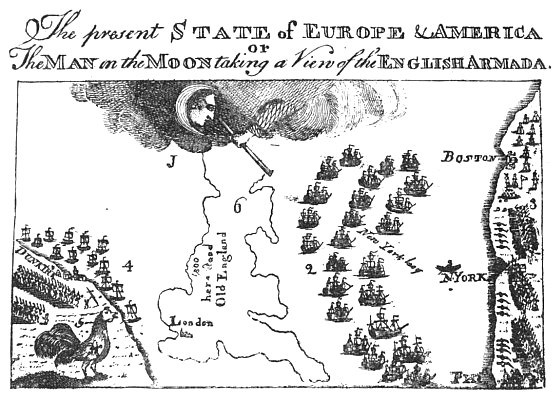 полная версия
полная версияThe American Revolution
Such was the strange sequel of a campaign which, whether we consider the picturesqueness of its incidents or the magnitude of its results, was one of the most memorable in the history of mankind. Its varied scenes, framed in landscapes of grand and stirring beauty, had brought together such types of manhood as the feathered Mohawk sachem, the helmeted Brunswick dragoon, and the blue-frocked yeoman of New England, – types of ancient barbarism, of the militancy bequeathed from the Middle Ages, and of the industrial democracy that is to possess and control the future of the world. These men had mingled in a deadly struggle for the strategic centre of the Atlantic coast of North America, and now the fight had ended in the complete and overwhelming defeat of the forces of George III. Four years, indeed, – four years of sore distress and hope deferred, – were yet to pass before the fruits of this great victory could be gathered. The independence of the United States was not yet won; but the triumph at Saratoga set in motion a train of events from which the winning of independence was destined surely to follow.
VOLUME II
CHAPTER VIII
THE FRENCH ALLIANCE
The history of the Revolutionary War may be divided into four well-marked periods. The first period begins in 1761 with the resistance of James Otis to the general search-warrants, and it may be regarded as ending in June, 1774, when the acts for changing the government of Massachusetts were intended to take effect. This period of constitutional discussion culminated in the defiance of Great Britain by the people of Boston when they threw the tea into the harbour; and the acts of April, 1774, by which Parliament replied to the challenge, were virtually a declaration of war against the American colonies, though yet another year elapsed before the first bloodshed at Lexington.
The second period opens with June, 1774, when Massachusetts began to nullify the acts of Parliament, and it closes with the Declaration of Independence. During this period warfare was carried on only for the purpose of obtaining a redress of grievances, and without any design of bringing about a political separation of the English people in America from the English people in Britain. The theatre of war was mainly confined to New England and Canada; and while the Americans failed in the attempt to conquer Canada, their defensive warfare was crowned with success. The fighting of this period began with the victory of Lexington: it ended with the victory of Fort Moultrie. New England, except the island of Newport, was finally freed from the presence of the British, and no further attack was made upon the southern states for more than two years.
The essential feature of the third period, comprising the years 1776 and 1777, was the struggle for the state of New York and the great natural strategic line of the Mohawk and Hudson rivers. Independence having been declared, the United States and Great Britain were now fighting each other single-handed, like two separate and foreign powers. It was the object of Great Britain to conquer the United States, and accordingly she struck at the commercial and military centre of the confederation. If she could have thoroughly conquered the state of New York and secured the line of the Hudson, she would have broken the confederation in two, and might perhaps have proceeded to overcome its different parts in detail. Hence in this period of the war everything centres about New York, such an outlying expedition as that of Howe against Philadelphia having no decisive military value except in its bearings upon the issue of the great central conflict. The strategy of the Americans was mainly defensive, though with regard to certain operations they assumed the offensive with brilliant success. The period began with the disasters of Long Island and Fort Washington; it ended with the triumph of Saratoga. As the net result of the two years’ work, the British had taken and held the cities of New York and Philadelphia and the town of Newport. The fortress of Ticonderoga, which they had likewise taken, they abandoned after the overthrow of Burgoyne; and in like manner they retired from the highlands of the Hudson, which the Americans now proceeded to occupy with a stronger force than before. In short, while the British had lost an army, they had conquered nothing but the ground on which they were actually encamped. Their attempt to break through the centre of the American position had ended in a total defeat, and it now began to seem clear to discerning minds that there was small chance of their being able to conquer the United States.
The fourth period, upon which we are now entering, begins with the immediate consequences of the victory of Saratoga, and extends to the treaty of 1783, whereby Great Britain acknowledged the independence of the United States. The military history of this period ends with the surrender of Cornwallis at Yorktown, in October, 1781, just four years after the surrender of Burgoyne. Except as regards the ultimate triumph of the American arms, the history of these four years presents striking contrasts to the history of the two years we have just passed in review. The struggle is no longer confined to the arms of Great Britain and the United States, but it extends in some measure over the whole civilized world, though it is only France, with its army and more especially its navy, that comes into direct relation with the final result in America. Moreover, instead of a well-aimed and concentrated blow at the centre of the American position, the last period of the war consisted partly of a straggling and disorderly series of movements, designed simply to harass the Americans and wear out their patience, and partly of an attempt to conquer the southern states and detach them from the Union. There is, accordingly, less dramatic unity in this last stage of the war than in the period which ended at Saratoga, and it is less susceptible of close and consecutive treatment; but, on the other hand, in richness of incidents and in variety of human interest it is in no wise inferior to the earlier periods.
Consternation in EnglandThe first consequence of Saratoga was the retreat of the British government from every one of the positions for the sake of which it had begun the war. The news of Burgoyne’s surrender reached England just before Parliament adjourned for Christmas, and Lord North immediately gave notice that as soon as the holidays were over he should bring in measures for conciliating the Americans. The general feeling in England was one of amazement and consternation. In these days, when we are accustomed to contemplate military phenomena of enormous magnitude, when we have lately carried on a war in which more than two million men were under arms, and more than two million dollars were expended every day, we must not forget how different was the historic background upon which events were projected a century ago. Those were not the days of submarine telegraphs and Cunard steamships, and in trying to carry on warfare across three thousand miles of ocean the problem before George III. was far more arduous than that which the great Frederick had solved, when, acting on interior lines and supported by British gold, he overcame the combined assaults of France and Austria and Russia. The loss which Great Britain had now suffered could not easily be made good. At the same time it was generally believed, both in England and on the continent of Europe, that the loss of the American colonies would entail the ruin of the British Empire. Only a few wise political economists, “literary men,” like Adam Smith and Josiah Tucker, were far-seeing enough to escape this prodigious fallacy; even Chatham was misled by it. It was not understood that English America and English Britain were bound together by commercial and social ties so strong that no question of political union or severance could permanently affect them. It was not foreseen that within a century the dealings of Great Britain with the independent United States would far exceed her dealings with the rest of the world. On the contrary, it was believed that if political independence were conceded to the Americans, the whole stream of transatlantic commerce would somehow be diverted to other parts of Europe, that the British naval power would forthwith decay, and that England would sink from her imperial position into such a mere insular nation as that over which Henry VIII. had ruled. So greatly did men overrate political conditions; so far were they from appreciating those economic conditions which are so much more deep-seated and essential.

LORD NORTH
Views of the different parties
Under these circumstances, the only people in England who were willing to concede the independence of the United States were the Rockingham Whigs, and these were now in a small minority. Lord Rockingham and his friends, with Burke as their leader, had always condemned the harsh and stupid policy of the government toward America, and they were now ready to concede independence because they were convinced that conciliation was no longer practicable. Lord Chatham, on the other hand, with his section of the Whig party, while even more emphatically condemning the policy of the government, still clung to the hope of conciliation, and could not bear to think of the disruption of the empire. But with the Tory party, which had all along supported the government, the war was still popular, and no calamity seemed so great as the loss of the American colonies. Most of the country squires believed in crushing out rebellion, no matter where it occurred or for what reason, and this view was almost unanimously taken by the clergy. In the House of Lords none were so bloodthirsty as the bishops, and country parsons preached from all the texts of the Old Testament which refer to smiting Jehovah’s enemies hip and thigh. The trading classes in the large towns, and the few manufacturers who had come upon the scene, were so afraid of losing the American market that they were ready to vote men and money without stint. The town of Manchester even raised and equipped two regiments at its own expense. Thus while the great majority of the British nation believed that America must be retained at whatever cost, a majority of this majority believed that it must be conquered before it could be conciliated or reasoned with; and this was the opinion which had thus far found favour with Lord North and controlled the policy of the government.
Lord North’s political somersaultWe may imagine, then, the unspeakable amazement of the House of Commons, on the 17th of February, 1778, when Lord North arose in his place and moved that every one of the points for which Samuel Adams and his friends had zealously contended, from the passage of the Stamp Act to the breaking out of war, should at once be conceded forever and without further parley. By the bill which he now proceeded to read, the famous Tea Act and the act for changing the constitution of Massachusetts were unconditionally repealed. It was furthermore declared that Parliament would renounce forever the right of raising a revenue in America; and it was provided that commissioners should be sent over to treat with Congress, armed with full powers for negotiating a peace. Pending the negotiations the commissioners might proclaim a truce, and might suspend the operation of any act of Parliament relating to America which had been passed since 1763. They might also proclaim complete amnesty for all political offences.

So complete a political somersault has seldom been turned by an English minister, and the speech in which Lord North defended himself was worthy of the occasion. Instead of resigning when he saw that his policy had proved a failure, as an English minister would naturally do, he suddenly shifted his ground, and adopted the policy which the opposition had urged in vain against him three years before, and which, if then adopted, would unquestionably have prevented bloodshed. Not only did he thus shift his ground, but he declared that this policy of conciliation was really the one which he had favoured from the beginning. There was more truth in this than appeared at the moment, for in more than one instance Lord North had, with culpable weakness, carried out the king’s policy in defiance of his own convictions. It was in vain, however, that he sought to clear himself of responsibility for the Tea Act, the oppressive edicts of 1774, and the recent events in America generally. The House received his bill and his speech in profound silence. Disgust and dejection filled every bosom, yet no one could very well help voting for the measures. The Tories, already chagrined by the bitter news from Saratoga, were enraged at being thus required to abandon all the ground for which they had been fighting, yet no way seemed open for them but to follow their leader. The Whigs were vexed at seeing the wind taken out of their sails, but they could not in honour oppose a policy which they had always earnestly supported. All sat for some moments in grim, melancholy silence, till Charles Fox, arising, sarcastically began his speech by congratulating his Whig friends on having gained such a powerful and unexpected ally in the prime minister. Taunts and innuendoes flew back and forth across the House. From the Tory side came sullen cries that the country was betrayed, while from among the Whigs the premier was asked if he supposed himself armed with the spear of Achilles, which could heal the wounds that itself had made. It was very pointedly hinted that the proposed measures would not be likely to produce much effect upon the Americans unless accompanied by Lord North’s resignation, since, coming from him, they would come as from a tainted spring. But in spite of all this ill-feeling the bill was passed, and the same reasons which had operated here carried it also through the House of Lords. On the 11th of March it received the royal signature, and three commissioners were immediately appointed to convey information of this action to Congress, and make arrangements for a treaty of peace.
Treaty between France and the United States, Feb. 6, 1778The conciliatory policy of Lord North had come at least two years too late. The American leaders were now unwilling to consider the question of reunion with the mother-country upon any terms, and even before the extraordinary scene in Parliament which we have just witnessed a treaty had been made with France, by which the Americans solemnly agreed, in consideration of armed support to be furnished by that power, never to entertain proposals of peace from Great Britain until their independence should be acknowledged, and never to conclude a treaty of peace except with the concurrence of their new ally. The French government had secretly assisted the Americans as early as the summer of 1776 by occasional loans of money, and by receiving American privateers in French ports. The longer Great Britain and her colonies could be kept weakening each other by warfare, the greater the hope that France might at some time be enabled to step in and regain her lost maritime empire. But it was no part of French policy to take an active share in the struggle until the proper moment should come for reaping some decisive material advantage. At the beginning of the year 1778 that moment seemed to have arrived. The capture of Burgoyne and the masterly strategy which Washington had shown, in spite of his ill-success on the field, had furnished convincing proof that the American alliance was worth having. At the same time, the announcement that Lord North was about to bring in conciliatory measures indicated that the British government was weakening in its purpose. Should such measures succeed in conciliating the Americans and in bringing about a firm reunion with the mother-country, the schemes of France would be irretrievably ruined. Now, therefore, was the golden opportunity, and France was not slow to seize it. On the 6th of February the treaty with the United States was signed at Paris. By a special article it was stipulated that Spain might enter into the alliance at her earliest convenience. Just now, too, Frederick the Great publicly opened the port of Dantzic to American cruisers and prohibited Hessian soldiers from passing through his dominions to the seaboard, while he wrote to Franklin at Paris that he should probably soon follow the king of France in recognizing the independence of the United States.
Great Britain declares war against France, March 13Rumours of all these things kept coming to England while the conciliatory measures were passing through Parliament, and on the 13th of March, two days after those measures had become law, the action of France was formally communicated to the British government, and war was instantly declared.

The situation of England seemed desperate. With one army lost in America, with the recruiting ground in Germany barred against her, with a debt piling up at the rate of a million dollars a week, and with a very inadequate force of troops at home in case of sudden invasion, she was now called upon to contend with the whole maritime power of France, to which that of Spain was certain soon to be added, and, to crown all, the government had just written its own condemnation by confessing before the world that its policy toward America, which had been the cause of all this mischief, was impracticable as well as unrighteous.[15]
The Earl of ChathamAt this terrible moment the eyes of all England were turned upon one great man, old now and wasted by disease, but the fire of whose genius still burned bright and clear. The government must be changed, and in the Earl of Chatham the country had still a leader whose very name was synonymous with victory. Not thus had matters gone in the glorious days of Quiberon and Minden and Quebec, when his skilful hand was at the helm, and every heart in England and America beat high with the consciousness of worthy ends achieved by well-directed valour. To whom but Chatham should appeal be made to repair the drooping fortunes of the empire? It was in his hands alone that a conciliatory policy could have any chance of success. From the first he had been the consistent advocate of the constitutional rights of the Americans; and throughout America he was the object of veneration no less hearty and enthusiastic than that which was accorded to Washington himself. Overtures that would be laughed at as coming from North would at least find respectful hearing if urged by Chatham. On the other hand, should the day for conciliation have irrevocably passed by, the magic of his name was of itself sufficient to create a panic in France, while in England it would kindle that popular enthusiasm which is of itself the best guarantee of success. In Germany, too, the remembrance of the priceless services he had rendered could not but dispel the hostile feeling with which Frederick had regarded England since the accession of George III. Moved by such thoughts as these, statesmen of all parties, beginning with Lord North himself, implored the king to form a new ministry under Chatham. Lord Mansfield, his bitterest enemy, for once declared that without Chatham at the helm the ship of state must founder, and his words were echoed by Bute and the young George Grenville. At the opposite extreme of politics, the Duke of Richmond, who had long since made up his mind that the colonies must be allowed to go, declared, nevertheless, that if it were to be Chatham who should see fit to make another attempt to retain them, he would aid him in every possible way. The press teemed with expressions of the popular faith in Chatham, and every one impatiently wondered that the king should lose a day in calling to the head of affairs the only man who could save the country. But all this unanimity of public opinion went for nothing with the selfish and obdurate king. All the old reasons for keeping Chatham out of office had now vanished, so far as the American question was concerned; for by consenting to North’s conciliatory measures the king had virtually come over to Chatham’s position, and as regarded the separation of the colonies from the mother-country, Chatham was no less unwilling than the king to admit the necessity of such a step.
The king’s rageIndeed, the policy upon which the king had now been obliged to enter absolutely demanded Chatham as its exponent instead of North. Everybody saw this, and no doubt the king saw it himself, but it had no weight with him in the presence of personal considerations. He hated Chatham with all the ferocity of hatred that a mean and rancorous spirit can feel toward one that is generous and noble; and he well knew besides that, with that statesman at the head of affairs, his own share in the government would be reduced to nullity. To see the government administered in accordance with the policy of a responsible minister, and in disregard of his own irresponsible whims, was a humiliation to which he was not yet ready to submit. For eight years now, by coaxing and bullying the frivolous North, he had contrived to keep the reins in his own hands; and having so long tasted the sweets of power, he was resolved in future to have none but milksops for his ministers. In face of these personal considerations the welfare of the nation was of little account to him.[16] He flew into a rage. No power in heaven or earth, he said, should ever make him stoop to treat with “Lord Chatham and his crew;” he refused to be “shackled by those desperate men” and “made a slave for the remainder of his days.” Rather than yield to the wishes of his people at this solemn crisis, he would submit to lose his crown. Better thus, he added, than to wear it in bondage and disgrace.
What Chatham would have tried to doIn spite of the royal wrath, however, the popular demand for a change of government was too strong to be resisted. But for Lord Chatham’s sudden death, a few weeks later, he would doubtless have been called upon to fill the position which North was so anxious to relinquish. The king would have had to swallow his resentment, as he was afterwards obliged to do in 1782. Had Chatham now become prime minister, it was his design to follow up the repeal of all obnoxious legislation concerning America by withdrawing every British soldier from our soil, and attacking France with might and main, as in the Seven Years’ War, on the ocean and through Germany, where the invincible Ferdinand of Brunswick was again to lead the armies of Great Britain. In America such a policy could hardly have failed to strengthen not only the loyalists and waverers, but also the Whigs of conciliatory mould, such as Dickinson and Robert Morris. Nor was the moment an inopportune one. Many Americans, who were earnest in withstanding the legislative encroachments of Parliament, had formerly been alienated from the popular cause by what they deemed the needlessly radical step of the Declaration of Independence. Many others were now alienated by the French alliance. In New England, the chief stronghold of the revolutionary party, many people were disgusted at an alliance with the Catholic and despotic power which in days gone by had so often let loose the Indian hell-hounds upon their frontier. The treaty with France was indeed a marriage of convenience rather than of affection. The American leaders, even while arranging it, dreaded the revulsion of feeling that might ensue in the country at large; and their dread was the legitimate hope of Chatham. To return to the state of things which had existed previous to 1765 would no doubt be impossible. Independence of some sort must be conceded, and in this Lord Rockingham and the Duke of Richmond were unquestionably right. But Chatham was in no wise foolish in hoping that some sort of federal bond might be established which should maintain Americans and British in perpetual alliance, and, while granting full legislative autonomy to the colonies singly or combined, should prevent the people of either country from ever forgetting that the Americans were English. There was at least a chance that this noble policy might succeed, and until the trial should have been made he would not willingly consent to a step that seemed certain to wreck the empire his genius had won for England. But death now stepped in to simplify the situation in the old ruthless way.







